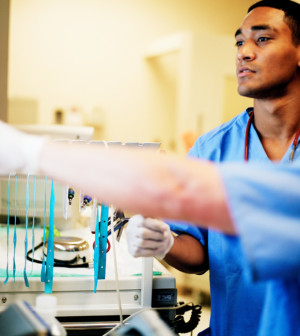- 8 Ways to Increase Dopamine Naturally
- 7 Best Breads for Maintaining Stable Blood Sugar
- Gelatin vs. Collagen: Which is Best for Skin, Nails, and Joints?
- The Long-Term Effects of Daily Turmeric Supplements on Liver Health
- Could Your Grocery Store Meat Be Causing Recurring UTIs?
- Are You Making This Expensive Thermostat Error This Winter?
- Recognizing the Signs of Hypothyroidism
- 10 Strategies to Overcome Insomnia
- Could Artificial Sweeteners Be Aging the Brain Faster?
- Techniques for Soothing Your Nervous System
Health Highlights: Feb. 18, 2014


Here are some of the latest health and medical news developments, compiled by the editors of HealthDay:
Saliva Test May Spot Depression Risk in Male Teens
A simple saliva test might one day spot which teenaged boys are most likely to develop major depression later in life, British researchers report.
After testing both boys and girls who had been diagnosed with mild depression, the researchers found that boys with high levels of a stress hormone called cortisol were 14 times more likely to be diagnosed with clinical depression later, according to the Associated Press.
Girls with high cortisol levels were only four times more likely to receive such a diagnosis during the course of the study, the AP reported.
At this point in time, there is no biological way to measure depression risk, the news service reported.
“This is the emergence of a new way of looking at mental illness,” study co-author Joe Herbert, of the University of Cambridge, told reporters during a Monday news conference. “You don’t have to rely simply on what the patient tells you, but what you can measure inside the patient.”
In the study, published online Monday in the Proceedings of the National Academy of Sciences, saliva samples were collected from more than 1,800 children aged 12 to 19. The teens were also questioned about depression symptoms, and all were followed for at least three years.
Experts told the AP that male and female hormones might react differently to cortisol, and that might explain the stronger correlation between the hormone and depression risk in males.
—–
Number of Fertility Treatment Babies in U.S. Increasing
A record number of babies born in the United States in 2012 were conceived using fertility treatment, according to a new study.
In vitro fertilization (IVF) led to the birth 61,740 babies that year, which was 1.5 percent of all births in the nation. There were 2,000 more IVF-associated births in 2012 than in 2011, the Associated Press reported.
The Society for Assisted Reproductive Technology study also said that a growing number of women are using one embryo at a time in order to prevent multiple births, which can increase the risk of premature birth and other problems.
Four percent of women younger than 35 used single embryos in 2007, compared with 15 percent in 2012, the AP reported.
Copyright © 2026 HealthDay. All rights reserved.










